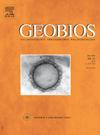来自Alsótelekes(匈牙利)晚中新世人猿地区的水獭科(哺乳目,偶蹄目)
IF 1.6
4区 地球科学
Q2 PALEONTOLOGY
引用次数: 4
摘要
对Alsótelekes(匈牙利东北部Borsod-Abaúj-Zemplén县)中新世晚期的绥科进行了描述,并将其划分为Propotamochoerus paleochoerus(绥亚科)和cf. Parachleuastochoerus(四齿龙科)。这两个分类群的共存与先前小型哺乳动物区系的生物年代学相关性表明的早期瓦列西亚(MN 9)相一致,并表明存在林地环境,地下资源丰富,可直接获得水。这与地理位置接近的Rudabánya遗址所记录的Pannon湖的多样性湿地和河岸森林非常吻合。讨论了欧洲四齿兽科复杂的分类。本文章由计算机程序翻译,如有差异,请以英文原文为准。
Suidae (Mammalia, Artiodactyla) from the late Miocene hominoid locality of Alsótelekes (Hungary)
The Suidae from the late Miocene of Alsótelekes (northeastern Hungary, Borsod-Abaúj-Zemplén county) are described and assigned to Propotamochoerus palaeochoerus (Suinae) and cf. Parachleuastochoerus (Tetraconodontinae). The co-occurrence of these two taxa agrees with a reference to the early Vallesian (MN 9), as previously indicated from biochronological correlation of the small mammal fauna, and suggests the presence of woodland environments, with abundance of below-ground resources and direct access to water. This fits well with the diverse wetlands and riparian forests that characterized Lake Pannon ∼10 Ma, as documented in the geographically close site of Rudabánya. The convoluted taxonomy of European Tetraconodontinae is discussed.
求助全文
通过发布文献求助,成功后即可免费获取论文全文。
去求助
来源期刊

Geobios
地学-古生物学
CiteScore
3.30
自引率
6.20%
发文量
28
审稿时长
6-12 weeks
期刊介绍:
Geobios publishes bimonthly in English original peer-reviewed articles of international interest in any area of paleontology, paleobiology, paleoecology, paleobiogeography, (bio)stratigraphy and biogeochemistry. All taxonomic groups are treated, including microfossils, invertebrates, plants, vertebrates and ichnofossils.
Geobios welcomes descriptive papers based on original material (e.g. large Systematic Paleontology works), as well as more analytically and/or methodologically oriented papers, provided they offer strong and significant biochronological/biostratigraphical, paleobiogeographical, paleobiological and/or phylogenetic new insights and perspectices. A high priority level is given to synchronic and/or diachronic studies based on multi- or inter-disciplinary approaches mixing various fields of Earth and Life Sciences. Works based on extant data are also considered, provided they offer significant insights into geological-time studies.
 求助内容:
求助内容: 应助结果提醒方式:
应助结果提醒方式:


